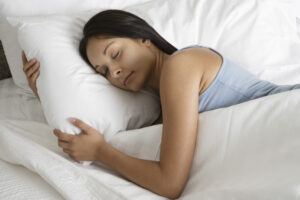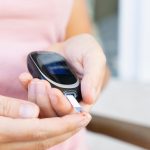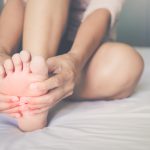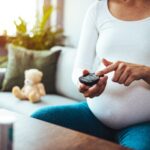January 24, 2024
Many people experience a slump in energy after a meal, and some may even become sleepy. But when is sleepiness after eating a cause for concern?
When tiredness gets in the way of daily activities, it could point to a more serious medical condition. Explore how sleepiness can be linked to diabetes, what other symptoms to look for, and what else can cause someone to be tired after eating.
Is Falling Asleep After Eating a Sign of Diabetes?
 Falling asleep after eating could be a sign of diabetes, more commonly type 2 diabetes. A person who has this chronic condition experiences something called insulin resistance. Insulin resistance is when the body does not make enough insulin to maintain normal blood sugar levels. Therefore, blood sugar levels can be too high or too low.
Falling asleep after eating could be a sign of diabetes, more commonly type 2 diabetes. A person who has this chronic condition experiences something called insulin resistance. Insulin resistance is when the body does not make enough insulin to maintain normal blood sugar levels. Therefore, blood sugar levels can be too high or too low.
After blood sugar is too high, and then comes back down to normal levels, a dip in energy can occur, causing sleepiness. This crash in blood sugar is called hyperglycemia.
When blood sugar is too low, below 70 mg/dL, it can cause hypoglycemia. Hypoglycemia and hyperglycemia can cause people with diabetes to fall asleep after eating.
Why People With Diabetes Fall Asleep After Eating
Blood Sugar Regulation
One reason for those with diabetes to fall asleep after eating is blood sugar control. It’s natural for changes in blood sugar to occur after eating food, so it’s important to check your blood sugar levels if you have diabetes. Studies have shown a direct link between tiredness and people with type 2 diabetes, when the condition is not being properly taken care of. However, more and more evidence is being discovered that other factors of the condition may be responsible for the sleepiness after eating.
Inflammation
Evidence has shown that chronic inflammation could be a primary cause of symptoms of diabetes, including fatigue. Inflammation occurs when the body encounters viruses, bacteria, toxic chemicals, or suffers injury. The body defends itself by sending out inflammatory cells to trap bacteria, viruses, and toxic chemicals, or heal injured tissue. This process can cause redness, swelling, bruising, or pain.
One study showed that those with type 2 diabetes had more inflammation in their body, than those with type 1 diabetes. People with type 2 diabetes also experienced more tiredness or fatigue. Further into the study, evidence shows that managing inflammation can decrease sleepiness after eating.
Lifestyle
Lifestyle factors and other symptoms of diabetes can cause sleepiness, which may worsen after meals. While some of these factors may be the same between those with type 1 and type 2 diabetes, others are unique to a specific type.
Here are a few lifestyle factors that can cause fatigue in those with diabetes:
| Type 1 & Type 2 Diabetes | Type 1 Diabetes | Type 2 Diabetes |
| Pain | Lack of exercise | Body Mass Index (BMI) |
| Poor Sleep Quality | Depression | Poor Quality of Life |
How to Know if Sleepiness is Linked to Diabetes
If you have diabetes, there will be other signs and symptoms that will accompany fatigue. If you experience any of these symptoms you inform your primary care physician for a proper diagnosis.
Here are other signs or symptoms you may experience if you have diabetes:
- Weight loss
- Hunger after eating
- Increased thirst
- Increased urination
- Blurred vision
- Tingling or numbness in the hands and feet
- Mood swings
- Irritability
- Dry skin
- Wounds are slow to heal
Those with diabetes may not experience every symptom but still have the disease, so a proper diagnosis is necessary. It’s also important to note that having some of these symptoms does not automatically mean you have diabetes. They could be linked to other medical conditions.
What Other Reasons Do People Fall Asleep After Eating?
 While it is important to consider and rule out any serious medical conditions by talking to your primary care physician, falling asleep after eating doesn’t automatically mean something is wrong. Other reasons could be responsible for the sleepiness after meals.
While it is important to consider and rule out any serious medical conditions by talking to your primary care physician, falling asleep after eating doesn’t automatically mean something is wrong. Other reasons could be responsible for the sleepiness after meals.
Many who experience sleepiness after eating are experiencing postprandial somnolence, also called a food coma. The dip in energy and sense of sleepiness will typically hit 30 minutes to an hour after eating and can persist for several hours. There are different theories as to why tiredness occurs after eating; the thinking among researchers is that it is natural and not a cause of concern.
While postprandial somnolence may not be a concern on its own, if you’re experiencing other symptoms, it can point to a more serious medical condition. If you experience persistent sleepiness after meals, it could also be due to a poor diet, lack of exercise, or poor sleep quality.
The Food You Eat
Is falling asleep after eating sugar a sign of diabetes? Not always. Some food types can make you sleepier than others. For example, foods rich in carbohydrates and protein can cause sleepiness. Research suggests this occurs with certain foods because the body produces more serotonin. Serotonin helps make melatonin, which aids in sleep.
Here is a list of protein and carbohydrate-rich foods that could cause sleepiness after eating:
- Poultry
- Salmon
- Eggs
- Spinach
- Cheese
- Mik
- Soy products
- Seeds
- Rice
- Pasta
- White bread
- Cakes, donuts, muffins, and cookies
- Sugar, including candy
It’s not just what you eat that can cause sleepiness after meals, but how much you eat. Individuals who eat larger meals, especially during lunch, will experience a spike in blood sugar. When the blood sugar level returns to normal a dip in energy occurs.
Lack of Exercise
 Lack of exercise can lead to tiredness, which can become worse after eating food. Not getting enough physical activity throughout the week can cause a reconditioning of your cardiovascular and musculoskeletal systems, and lead to depression. All these factors can cause fatigue.
Lack of exercise can lead to tiredness, which can become worse after eating food. Not getting enough physical activity throughout the week can cause a reconditioning of your cardiovascular and musculoskeletal systems, and lead to depression. All these factors can cause fatigue.
On the other hand, studies show that increased regular exercise provides more consistent energy throughout the day. Physical activity can help to combat sleepiness after meals.
Sleep Quality
Sleep problems can lead to tiredness throughout the day, not just after meals. The tiredness due to a lack of sleep can become worse after meals. It’s important to create and maintain healthy sleep habits to avoid feeling tired throughout the day, including smaller meals, avoiding alcohol and caffeine, exercising, maintaining a consistent sleep schedule, and more.
How to Avoid Sleepiness After Eating
Feeling sleepy after meals can be frustrating, especially if it disrupts your daily activities. Fortunately, there are simple ways to improve your energy levels, provided the sleepiness isn’t linked to diabetes or other medical conditions.
Here are some ways you can prevent sleepiness after eating:
- Improve your sleep quality: Make any necessary changes to ensure you’re getting enough sleep and a good quality of sleep throughout the night. Good sleep will make it less likely for you to experience a dip in energy after meals.
- Eat smaller meals: Avoid heavy meals loaded with protein and carbohydrate-rich foods. Instead, eat smaller meals more frequently so your blood sugar levels don’t spike and your energy can be maintained throughout the day.
- Get moving: Regular physical activity will help your sleep quality and boost energy during the day. Taking a short walk after eating can shake post-meal sleepiness and aid digestion.
- Avoid Alcohol: Alcohol can make you feel more tired, so if you’re having an issue with sleepiness after eating, try avoiding consuming any alcohol with your meals.
- Try light therapy: Similar to how light in the morning helps to wake you up by suppressing the production of melatonin in the body, bright light can help combat tiredness after meals.
It’s also acceptable to take a short nap during the day, especially as you are making lifestyle changes to improve your energy levels throughout the day. However, if none of these tips work to avoid sleepiness after eating, talking to your primary care physician is a good next step.
The Importance of Proper Diagnosis
Is feeling sleepy after eating a sign of diabetes? The answer is not black and white. Yes, it can be a symptom of diabetes, but it can also be a result of other lifestyle factors. While it’s important to recognize your symptoms, a professional provider should diagnose any condition. Healthcare Associates of Texas has been helping their patients in the Dallas/Fort Worth community for 25 years. If you have any medical concerns, their expert staff can be there to guide and treat you.
Sources
- Center for Disease Control and Prevention Staff. (2022, September 13). Tips for better sleep. Centers for Disease Control and Prevention. https://www.cdc.gov/sleep/aboutsleep/sleephtml
- Farizani, Dr. (2023, May 12). Is falling asleep after eating a sign of diabetes? Hillcroft Physicians. https://hillcroftphysicians.com/health-education/is-falling-asleep-after-eating-a-sign-of-diabetes/
- Fisher, A. (2023, April 12). Why do I feel tired after eating? causes and prevention. Medical News Today. https://www.medicalnewstoday.com/articles/323379#how-to-stop-feeling-tired-after-eating
- Kresser, C. (2021, May 4). Postprandial somnolence: Why a “Food coma” happens. Kresser Institute. https://kresserinstitute.com/postprandial-somnolence-why-a-food-coma-happens/
- Vetter, C. (2023, February 13). Feeling sleepy after eating could be diet, not diabetes. Feeling Sleepy After Eating Could Be Diet, Not Diabetes. https://zoe.com/learn/feeling-tired-after-eating-and-diabetes
- World Health Organization Staff. (2023, April 5). Diabetes. World Health Organization. https://www.who.int/news-room/fact-sheets/detail/diabetes
DISCLAIMER
The information featured in this site is general in nature. The site provides health information designed to complement your personal health management. It does not provide medical advice or health services and is not meant to replace professional advice or imply coverage of specific clinical services or products. The inclusion of links to other web sites does not imply any endorsement of the material on such websites.



